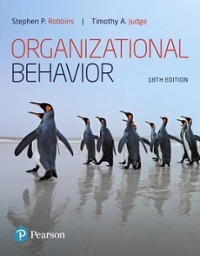Whether or not gossip benefits organizations has become a gray area. In some contexts, gossip may be
Question:
Whether or not gossip benefits organizations has become a gray area. In some contexts, gossip may be beneficial. Some leaders, such as Aviva Leebow Wolmer, CEO of Pacesetter, believe that gossip can be harnessed by managers to make a positive impact on the organization. While Wolmer generally believes gossip has a negative influence, she also thinks that gossip can be used as a way to bond with coworkers and to create a sense of excitement in the office. In addition, when employees gossip with clients, clients may feel more valued by the company because they were given that which they perceive to be the inside scoop.
What about when gossip alienates an employee? According to anthropologists, humans gained the ability to gossip through evolution. Gossip allowed our tribal ancestors to form bonds while also learning who to avoid. According to recent research, negative gossip may have been used to identify individuals who had broken norms (see Chapter 9) about sharing with the tribe. By ostracizing the individual who did not act in the best interest of the tribe, the group as a whole benefitted. Unfortunately, in the modern-day workplace, office gossip may serve to exclude others. And unlike our tribal ancestors, gossip is often not directed toward employees who have acted against a group. Instead, gossip about a specific individual is often a means of incivility.
An employee can deal with being the target of malicious office gossip in several ways. Dr. Berit Brogaard of the University of Miami suggests not confronting the person spreading rumors through the grapevine. Instead, reaching out to a supervisor (if they are not also part of the rumor mill) or human resources may beneficial. Alternatively, openly talking about gossip in a blasé manner may take away the gossiper’s motivation. Like many bullying behaviors, gossip is often meant to harm the target emotionally. When the gossiper realizes that he or she isn’t achieving this goal, he or she will sometimes stop.
Questions
1. What are some tactics employees can use to avoid being the target of office gossip?
2. As discussed in the chapter, there are positive benefits to gossip. How can managers create policies that target negative gossip while also preserving the benefits of positive gossip?
3. As stated above, gossip was originally a way to help group members identify an individual who did not act in the best interests of the group. Can gossip ever serve the same purpose in an office? Why or why not?
Step by Step Answer:

Organizational Behavior
ISBN: 9780134729329
18th Edition
Authors: Stephen RobbinsTimothy JudgeTimothy Judge, Timothy Judge





